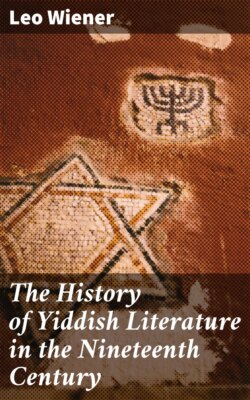Читать книгу The History of Yiddish Literature in the Nineteenth Century - Wiener Leo - Страница 8
На сайте Литреса книга снята с продажи.
IV. THE FOLKSONG
ОглавлениеTable of Contents
THE Jews have been preëminently inhabitants of towns; their very admission into Poland was based on the supposition that they would be instrumental in creating towns and cities, from which the agricultural Slavs kept aloof. Centuries of city life have incapacitated them for any other occupation than commerce and artisanship, and have entirely estranged them from nature. On the other hand, their civil disabilities and oppression have led them to cling more closely to the Bible and their religious lore than was customary among their coreligionists in other lands. It was in these Slavic countries that the Talmud was rediscovered and that it was introduced to the rest of Judaism. All these circumstances developed in them a strong retrospective spirit, so that in the centre of their intellectual horizon stands man in all his varying moods and vicissitudes of fortune. Consequently all their folksongs[38] have more or less of a lyrical tinge, and the consideration of nature is almost entirely absent from them; occasionally a flower, a natural phenomenon, finds a passing mention in them, but these are never used for their own intrinsic interest. Outside of himself, the Jew knows only his duties to God and his duties to man, as flowing from his duties to God. Not feeling himself as a constituent part of a nation, having no other union with his fellow-men except that of religion, he could never rise to the appreciation and formation of an epic poem, although the material for such a one was present in the very popular legend of the one-day king, Saul Wahl.[39]
The cradle songs reflect this spirit.[40] While babies of Gentiles hear meaningless nursery rhymes or comical ditties, Jewish infants are early made acquainted with the serious aspects of life. They are told of the ideal of their future occupation, which is commerce, they are spurred on to 'Tōre,' which is learning, mainly religious, and they are reminded that they must remain an 'ehrlicher,' i.e. an orthodox, Jew. The following poem is, probably, the most popular song in Judeo-German, as it is sung from Galicia to Siberia, and from the Baltic provinces to Roumania:
Hinter Jankeles Wiegele
Stēht a klār-weiss Ziegele: Ziegele is' gefāhren handlen Rožinkelach mit Mandlen. Rožinkelach mit Mandlen Sanen die beste S-chōre— Jankele wet lernen Tōre, Tōre wet er lernen, Briewelach wet er schreiben, Un' an ehrlicher Jüd' Wet er af tomid verbleiben.
Behind Jacob's cradle there stands a clear white goat: the goat has gone a-bartering raisins and almonds. Raisins and almonds are the best wares—Jacob will study the Law, the Law he will study, letters he will write, and an honest Jew he will forever remain.
But commerce and learning are not for girls. They are generally incapacitated for the first by their onerous duties of home; and learning, at least a knowledge of the Sacred language and its lore, has never been regarded as a requisite of woman. She received her religious instruction and ethical training by means of Judeo-German books which owe their very origin to the necessity of educating her. The name of the script in which all these books of the past three centuries are printed is Weiberdeutsch, indicating at once the use to which it was put. The title-pages of the works generally tell that they are 'gar hübsch bescheidlich far frumme Weiber un' Maidlich,' or that 'die Weiber un' Meidlich di Weil damit vertreiben die heiligen Täg.' The Biblical injunction 'fructify and multiply yourself' invests family life with a special sacredness, throws a gloom over the childless home, and leads this people to regard motherhood as the ideal state of the Jewish woman. All these sentiments find frequent expressions in their songs, and while the infant boy is lulled to sleep with a recitation of his future manly virtues, the baby girl hears in her cradle, 'In the month of Tamuz, my little lady, you will become a mother!'
Childhood alone claims exemption from oppressing thoughts and gloom: childhood must have its merriments, its pranks, its wantonness, no matter how serious life is to become later, or how soon it is to be ended. With the Jew youth, indeed, lasts but 'an hour,' and in after-life he has many an occasion to regret its short duration:
